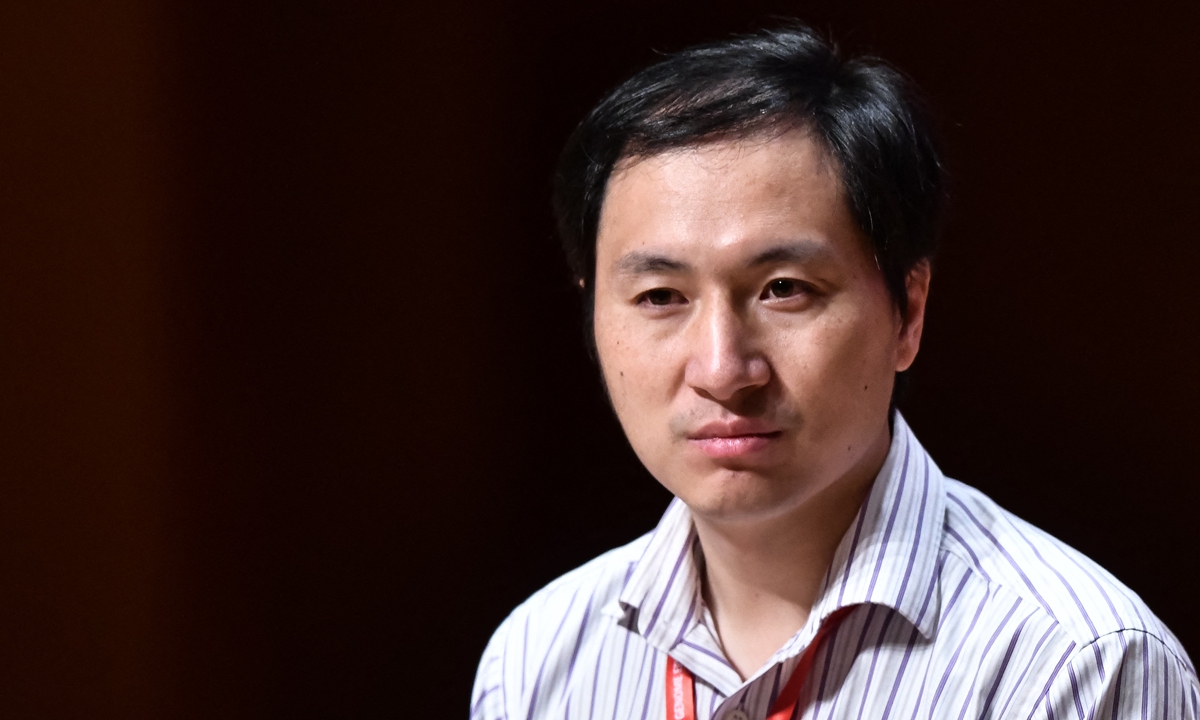Controversial Chinese scientist He Jiankui makes public appearance at online academic seminar, triggering heated discussion on research ethics

He Jiankui File Photo: AFP
He Jiankui, a controversial Chinese scientist who was previously imprisoned for three years for an illegal human genome editing case, recently made a public appearance at an academic seminar focusing on social values of CRISPR technology, sparking heated discussion on the ethical issues of scientific development.
Hosted by the Centre for Global Science and Epistemic Justice at the University of Kent, the seminar titled "Looking Back into the Future: CRISPR and Social Values" was held in Wuhan, Central China's Hubei Province, on Saturday.
According to the organizers, He was invited to the event to share his opinions on how ethics and scientific research can be better integrated and shed light on the future. He was given 40 minutes to share his work but he only talked for 25 minutes, mostly on basic scientific facts. He spent less than two minutes talking about his own work, mainly in general terms.
He confirmed that he is currently working in a new gene research on Duchenne muscular dystrophy. He mentioned the plan of setting up an international ethics committee for his current lab, but did not give any specification on its membership, plan or timeline.
In 2018, He, a genome-editing researcher at the Southern University of Science and Technology of China in Shenzhen, Guangdong Province, shocked the world as he claimed to have created the world's first genetically modified humans.
He was sentenced to three years in prison in December 2019 for illegally conducting the human embryo gene-editing intended for reproduction. He was reportedly released from prison in April 2022.
He caught most attention at the Saturday event as media and other researchers present kept asking him for details of his past controversial research and ethical issues surrounding the application of gene-editing technology. However, He declined to provide direct answers to these questions and instead emphasized the need for clearer regulations in both the US and China.
It is understandable that the public concerned about the past controversial research of He, including the current status of the gene-edited babies born during the research, but what is more important is that we should look back to and learn from the case to prevent similar problems in the future, Lei Ruipeng at the Huazhong University of Science and Technology in Wuhan and Joy Zhang, a collaborator of the event, said at the event.
The discussion highlighted regulatory and communicative gaps in China which we hope will receive due attention from relevant authorities, according to a summary of the event that Lei sent to the Global Times.
It also became evident that the research restrictions on He and the institutions responsible for enforcing them are not publicly known. Chinese participants have made explicit calls for more regulatory clarity within China, read the summary.
Xie Shangxian of Huazhong University of Science and Technology said at the event that regional disparity in ethics assessment and enforcement standards pose a challenge in China.
Xie underlined the explorative and future-oriented nature of science, which contrasts with the restrictive and history-based characteristics of bioethics. How to balance these two conflicting forces is the key challenge, Xie said.
After the controversial experiment of He in 2018, Chinese authorities and scientists have been enhancing regulations and discussions on bioethics. In October 2020, China set up a national science and technology ethics committee to improve the environment for scientific innovation.
Some scientists also suggested surveillance and protection measures for the three gene-editing babies born in He's experiment, as well as their descendants.
